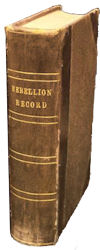.
FORT SUMTER,
S.C., December 28, 1860.
(Received A. G. O., January 1, 1861.)
Col. S. COOPER, Adjutant-General:
COLONEL: I have the honor to send herewith a copy of a memorandum received to-day from the governor of South Carolina, in reply to a message from me, which shows that for the present we are treated as enemies. I sent my post-adjutant this morning with a message to the commanding officer of Fort Moultrie asking by what authority he held possession of that work, and desiring to know whether he would make any opposition to my sending for some property, public and private, left there. He replied to my first question that he held that post by authority of the sovereign State of South Carolina, and in obedience to the orders of the governor. To the second, that his orders were not to permit public property of any kind to be removed on any pretext whatever; that he was directed to take an inventory of the same, and to send it to the governor; that he would with pleasure assist in recovering and restoring all private property that was left. This decision about the public property shows that South Carolina is acting in this matter also toward us as if we were her enemy. The amount of public property thus left is not great, as I merely retained enough to prevent my movement from being suspected. He requested Lieutenant Hall to say that at a general meeting of the officers, the military move I made was unanimously pronounced to have been one of consummate wisdom; that it was the best one that could have been made, and that if I had not effected it things would have been very different. Speaking of his own position, he remarked that the guns of Fort Sumter looked into his guns, and said that he ought not to have been ordered to fire upon me, because if I returned his fire he would be compelled to retire to the sand hills. There were yesterday two regiments to guard the island. The remark about his orders looks like an intention to attack me here. I must confess that I feel highly complimented by the expression of such an opinion (from those most deeply affected by it) of the change of position I felt bound to take to save my command and to prevent the shedding of blood. In a few days I hope, God willing, that I shall be so strong here that they will hardly be foolish enough to attack me. I must confess that we have yet something to do before, with my small force, I shall feel quite independent, as this work is not impregnable, as I have heard it spoken of.
Trusting that something may occur which will lead to a peaceful solution of the questions between the General Government and South Carolina,
I am, colonel, very respectfully, your obedient servant,
ROBERT ANDERSON,
Major, First Artillery, Commanding.
P. S.–I do not feel authorized to reply to the memorandum of the governor, but shall regret very deeply his persistence in the course he has taken. He knows not how entirely the city of Charleston is in my power. I can cut his communication off from the sea, and thereby prevent the reception of supplies, and close the harbor, even at night, by destroying the light-houses. These things, of course, I would never do, unless compelled to do so in self-defense.

[Inclosure.–Copy of memorandum from Governor Pickens.]

HEADQUARTERS, December 28, 1860.
In reply to Major Anderson’s request, made this morning verbally through First Lieutenant Snyder, from Fort Sumter, I hereby order and direct that free permission shall be given to him to send the ladies and camp women from Fort Sumter, with their private effects, to any portion of Sullivan’s Island, and that entire protection shall be extended to them. It is also agreed that the mails may be sent over to the officers at Fort Sumter by their boats, and that all the ladies of Captain Foster’s finally shall be allowed to pass, with their effects and the effects of any kind belonging to Captain Foster, from the Mills House to Fort Sumter, and the kindest regard shall be paid to them. Of course, Lieutenant Meade’s private effects can be taken possession of; but for the present there shall be no communications of any other kind allowed from the city to the fort, or any transportation of arms or ammunition, or any supplies, to the fort; and this is done with a view to prevent irregular collisions, and to spare the unnecessary effusion of blood.
F. W. PICKENS.









